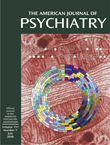Elevated Central Serotonin Transporter Binding Availability in Acutely Abstinent Cocaine-Dependent Patients
Abstract
OBJECTIVE: Recent work has underscored the role of serotonergic neurotransmission in chronic neural adaptations to cocaine dependence. The authors tested for evidence of serotonergic dysfunction during acute abstinence from cocaine, a period of high risk for relapse in cocaine dependence.METHOD: Binding availability of dopamine transporters and serotonin transporters was measured in 15 cocaine-dependent subjects during acute abstinence and in 37 healthy comparison subjects by using [123I]β-CIT and single photon emission computed tomography.RESULTS: Significant increases in diencephalic and brainstem serotonin transporter binding (16.7% and 31.6%, respectively) were observed in cocaine-dependent subjects. Brainstem serotonin transporter binding was significantly inversely correlated with age across diagnostic groups.CONCLUSIONS: These findings provide further evidence of serotonergic dysfunction during acute abstinence from chronic cocaine use. Age-related decline in brainstem serotonin transporter binding may underlie the poor response to selective serotonin reuptake inhibitor antidepressants seen in some elderly depressed patients.



